
 Earnings season begins
Earnings season begins
By Anne D. Picker, Chief Economist, Econoday
 Friday, April 13, 2007 Friday, April 13, 2007

Global Markets
All indexes followed here except those in Japan gained last week despite investor jitters about the approaching earnings
season. Stocks there were dragged down on worries about slowing U.S. growth. Stocks had been trading in one direction since the start of the second quarter — up. However, that changed after the release of the FOMC minutes from the March meeting on Wednesday afternoon. The minutes turned out to be more hawkish than analysts expected. As a result, anticipation of a U.S. interest rate cut drifted further out into the future. This of course disappointed equity investors and they sold stocks. However, spirits rebounded quickly and stocks once again reversed direction and resumed their climb. Oil prices remained in the $63 a barrel territory for West Texas intermediate crude but appear to have had little impact except
on U.S. consumer sentiment thus far. Prices have climbed despite the easing of political tensions after the return of the British marines that had been held captive. Traders are concerned about gasoline supplies now that the summer driving season is approaching.
IMF alters its growth forecast
In its twice-yearly World Economic Outlook, the IMF said that the world economic growth is strong and on course for a fifth year of expansion despite recent stock market volatility and the U.S. slowdown. The world economy is expected to expand 4.9 percent both this year and next. Most major economies saw their growth rates revised upward. However, that was not the case for the U.S. where growth was revised downward to 2.2 percent from 2.9 percent in their fall 2006 forecast.
Global Stock Market Recap
| |
|
2006 |
2007 |
% Change |
|
| |
Index |
December 29 |
April 6 |
April 13 |
Week |
Year |
|
| Asia |
|
|
|
|
|
|
|
| Australia |
All Ordinaries |
5644.3 |
6063.4 |
6123.8 |
1.0% |
8.5% |
|
| Japan |
Nikkei 225 |
17225.8 |
17484.8 |
17364.0 |
-0.7% |
0.8% |
|
| |
Topix |
1681.1 |
1717.1 |
1705.5 |
-0.7% |
1.5% |
|
| Hong Kong |
Hang Seng |
19964.7 |
20209.7 |
20341.0 |
0.6% |
1.9% |
|
| S. Korea |
Kospi |
1434.5 |
1484.2 |
1520.8 |
2.5% |
6.0% |
|
| Singapore |
STI |
2985.8 |
3345.9 |
3373.6 |
0.8% |
13.0% |
|
| |
|
|
|
|
|
|
|
| Europe |
|
|
|
|
|
|
|
| UK |
FTSE 100 |
6220.8 |
6397.3 |
6462.4 |
1.0% |
2.4% |
|
| France |
CAC |
5541.8 |
5741.4 |
5789.3 |
0.8% |
4.5% |
|
| Germany |
XETRA DAX |
6596.9 |
7099.9 |
7212.1 |
1.6% |
9.3% |
|
| |
|
|
|
|
|
|
|
| North America |
|
|
|
|
|
|
| United States |
Dow |
12463.2 |
12560.20 |
12612.13 |
0.4% |
1.2% |
|
| |
NASDAQ |
2415.3 |
2471.34 |
2491.94 |
0.8% |
3.2% |
|
| |
S&P 500 |
1418.3 |
1443.76 |
1452.85 |
0.6% |
2.4% |
|
| Canada |
S&P/TSX Comp. |
12908.4 |
13425.02 |
13578.62 |
1.1% |
5.2% |
|
| Mexico |
Bolsa |
26448.3 |
29370.94 |
29762.22 |
1.3% |
12.5% |
|
| Markets in France, Germany and the UK were closed on Monday, April 9. |
|
| Markets in Australia and Hong Kong were closed on Monday, April 9. |
Europe and the UK
On Tuesday, stocks in London, Paris and Frankfurt closed at their highest in over 6 years, but did not stay there for long. Higher oil prices boosted concern that U.S. consumer spending growth would slow. Stocks of companies most dependent on exports to the U.S. such as the international auto companies led the declines. Equities were also pressured by a new forecast for the U.S. from the International Monetary Fund. The IMF cut its forecast for U.S. growth and said the economy would grow at its slowest pace in five years.
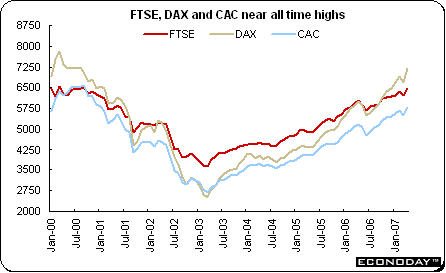
The indexes in Europe and London continue to follow U.S. stocks — rising and falling when those in the U.S. do. But merger news along with optimism about global growth (despite the softer U.S. forecast) revived investors and the three indexes once again advanced and ended the week at the highest in over 6 years. The gains were led by energy and pharmaceutical companies after oil prices climbed and an international drug maker forecast earnings that topped analysts' estimates. Oil advanced on expectations that U.S. gasoline consumption will spur demand for crude.
ECB on hold
As expected, the European Central Bank left its policy interest rate at 3.75 percent. The Bank had increased rates in March to that level. At his monthly press conference which is held after the ECB’s monetary policy meeting, president Jean Claude Trichet said that the ECB would act in a ‘firm and timely’ manner to prevent a pickup in inflation. The eurozone economy expanded at the fastest pace in six years in 2006 and data in the past two weeks have strengthened the case for higher rates. Unemployment dropped to 7.3 percent, the lowest rate since records began in 1993 while consumer and business confidence increased to the highest since 2001.
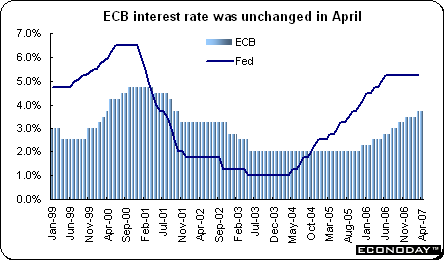
Trichet hinted that interest rates would increase to 4 percent when he said that “I would not say anything today that would be aimed at changing expectations for June.” Further, he said that monetary policy continues to be on the accommodative side and a boost to growth, while the inflation outlook remains vulnerable to upside risks. He did not use the code words "strong vigilance" in his statement. In the past Trichet has used them to signal a rate increase was forthcoming at the next Governing Council meeting.
Asia/Pacific
Equity indexes in the Asia/Pacific region were up last week with the exception of the Nikkei and Topix. They were down on worries about slowing U.S. growth and the impact it would have on Japanese exporters’ sales and profits. The All Ordinaries, STI and Kospi hit all time highs during the week but closed weakened on Friday after earnings of some major companies missed analysts’ estimates. Many Asian stock indexes climbed to six-week highs buoyed by record takeover proposals. According to analysts, the takeover theme has been one of the main drivers of the market for about a year and should continue. Australian stocks also benefited from higher copper prices which climbed to 5 month high. The STI responded to very favorable first quarter GDP growth. Singapore's GDP expanded an annualized 7.2 percent compared with a 7.9 percent pace in the previous three months and was much higher than analysts’ estimates. Shares reacted negatively to the International Monetary Fund forecast for the U.S. economy. The IMF trimmed its U.S. growth forecast to 2.2 percent from a September estimate of 2.9 percent, citing the weakening housing market.
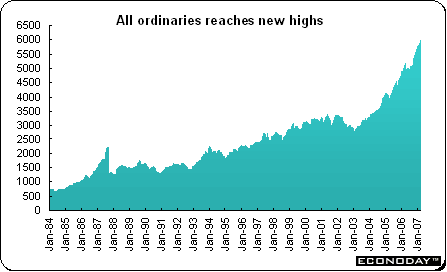
Japanese stocks have been lagging other regional stocks followed here. Automakers dropped last week after the yen strengthened against the dollar. A stronger yen reduces the value of exporters' profits when repatriated back into local currency and their products are less competitively priced abroad. Stocks in Japan are very sensitive to U.S. economic events. For example, on Thursday, equities followed U.S. markets down in reaction to the FOMC minutes that had been released the day before (Japanese markets were closed at the time). Asian stocks fell from a six-week high after the Federal Reserve said it may increase interest rates to curb inflation. Especially hard hit were auto exporters who rely on U.S. sales. Analysts said that the minutes reminded investors of the inflation threat. A delay in a longed for rate cut in the U.S. would hurt profit prospects of Asian exporters. Earlier in the week, non-government machine orders excluding shipping and utilities declined a much greater than expected 5.2 percent from a month earlier.
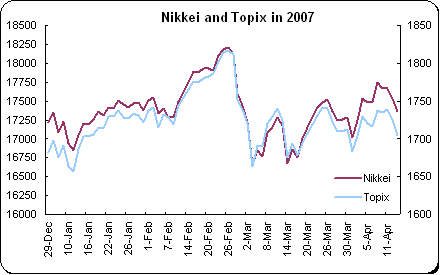
Bank of Japan
As expected, the Bank of Japan kept its policy interest rate unchanged at 0.5 percent for the second month. At his monthly press conference, BoJ governor Toshihiko Fukui opined that the U.S. economy would achieve a soft landing and Japan's consumer prices would increase in the long run after hovering around zero in the next several months. The Bank increased its key rate from near zero in July 206 for its first increase in six years, and doubled it in February. Fukui said the Bank is watching the effect of the February increase on the economy and reiterated that the timing of further rate adjustments cannot be predetermined because the already complex economic structure could change further.
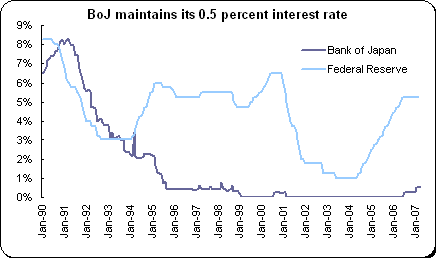
In its monthly economic assessment, the BoJ said that the country’s economy is expanding moderately, led by exports and business investment. Japan's core consumer prices, which exclude fresh food declined 0.1 percent in February when compared with a year earlier, the first drop since last April. The likelihood that prices will keep declining makes it harder for the Bank to raise rates in the next several months. Many analysts also speculate that it would be hard for the BoJ to increase rates again any time soon, because in addition to consumer price weakness, there could be political pressure before Upper House elections in July.
Currencies
The euro reached a series of record highs against the yen while at the same time climbing to two-year highs against the U.S. dollar after the ECB kept interest rates unchanged and suggested interest rates would be higher later this year, and as soon as June.
The yen gained against the dollar on speculation the Japanese currency's weakness would be discussed at the Group of Seven meeting in Washington April 13 and 14. The yen advanced from a record low against the euro after ECB president Trichet said the yen should reflect economic fundamentals. This in turn led traders to speculate that European finance chiefs and central bankers may discuss the euro's strength against the yen. The yen has fallen against all 16 most active currencies so far this month as Japanese investors step up purchases of higher yielding assets abroad for the fiscal year that began on April 1.
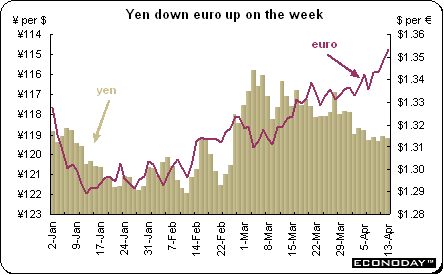
The U.S. dollar was hit as trade tensions between the U.S. and China intensified. The U.S. filed complaints against China because of the country’s failure to protect intellectual property rights. The U.S. also complained about Chinese restrictions on the sale of foreign books and films. China replied that the complaints would “severely damage” trade relations and economists said the comments added to fears that the Chinese treasury may reduce its purchases of U.S. bonds. There was also some nervousness ahead of the weekend’s G7 meeting in Washington.
Indicator scoreboard
EMU — Fourth quarter gross domestic product was up an unrevised 0.9 percent and 3.3 percent when compared with the same quarter a year ago. However, there were revisions in the components. Gross fixed capital formation was revised upward to a 5.8 percent gain on the year from 4.8 percent previously reported. However, both private and government consumption was revised downward slightly to 2 percent and 2.4 percent respectively from 2.1 percent and 2.5 percent on the year.
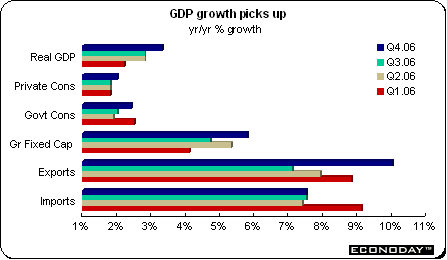
February industrial output was up 0.6 percent and 4.1 percent when compared with last year. All sectors were up on the month. Capital goods output was up 0.8 percent and 7.4 percent on the year. Energy was also up 0.8 percent after plunging 3.1 percent in the previous month thanks to mild weather. However, on the year output sank 5.5 percent.
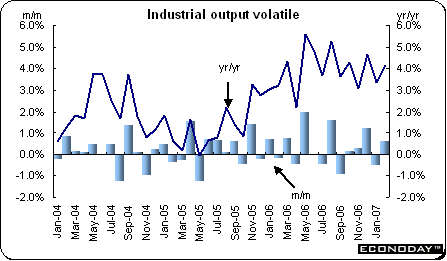
Germany — February seasonally adjusted merchandise trade surplus declined to €13.8 billion from €15.8 billion in January. The decline was due to higher prices for imported commodities. Both exports and imports were up 10.9 percent on the year. Exports to other members of the European Union were up 14.7 percent on the year while those to countries outside the EU were up 4.4 percent on the year. Imports from other EU countries were up 14.4 percent while those from countries outside the EU were up 5.2 percent on the year.
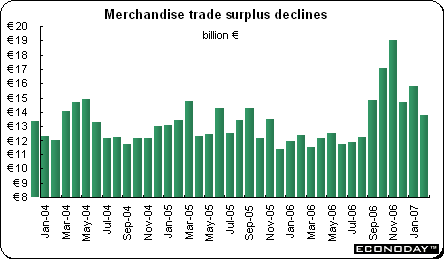
France — February seasonally adjusted industrial output was up 1.1 percent and 3.6 percent when compared with the same month a year earlier. Manufacturing output was up 1.4 percent and 2.6 percent on the year. Auto output was up 4.7 percent while semi-finished goods were up 1.3 percent. Consumer goods were up 1.2 percent while capital goods were up a sluggish 0.3 percent.
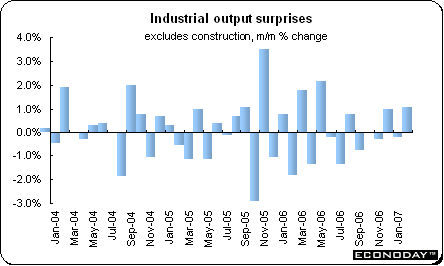
February merchandise trade deficit edged upward €2.7 billion from €2.6 billion in the previous month. Exports were up 3.1 percent but imports climbed by 3.2 percent. Although weak clothing, pharmaceutical and household durables but a damper on consumer goods exports, agricultural exports were up. Capital goods imports jumped 6 percent. With the EMU, the deficit with Germany climbed to €1.4 billion from €1.3 billion. The trade deficits with the U.S. and Japan were €277 million and €338 million respectively.
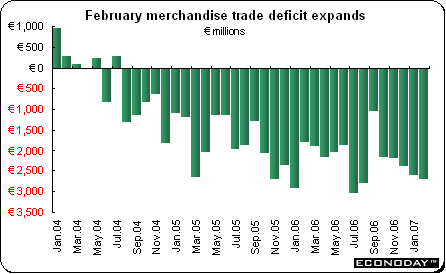
United Kingdom — February merchandise trade deficit increased to £6.79 billion from £6.40 billion in January. The deficit with other European Union countries swelled to £2.72 billion from £2.64 billion in January. The deficit with non-EU countries expanded to £4.07 billion from £3.76 billion. Imports were up 1.2 percent while exports declined by 0.5 percent. The total trade gap, which also includes services, widened to £4.31 billion while the services surplus remained stable at £2.48 billion.
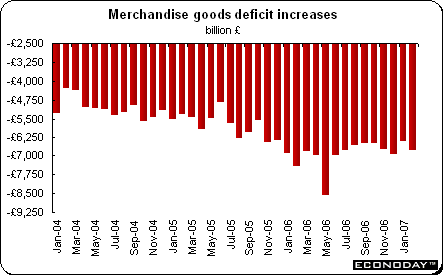
Asia
Japan — March corporate goods price index increased 0.3 percent and was up 2 percent when compared with the same month a year ago. Higher crude oil prices since the start of the year prompted Japanese refiners to raise wholesale gasoline prices.
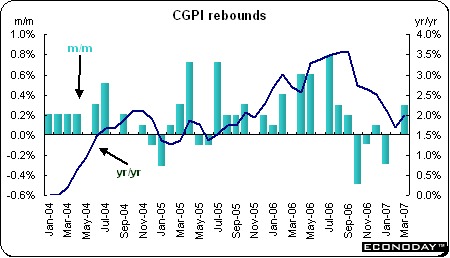
Australia — March employment was up by 10,500 jobs while the unemployment rate edged down to 4.5 percent, a 31 year low. Full time employment was up by 31,200 while part time employment dropped 21,200. Australia's participation rate, which measures the labor force as a percentage of the population aged over 15, fell 0.1 percentage point to 64.8 percent in March.
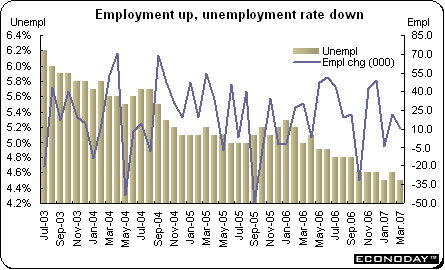
Americas
Canada —February merchandise trade surplus was down to C$4.8 billion from C$5.8 billion in January. Exports were down 2.1 percent from a record high in January partly as a result of a 15-day railway strike, which interrupted regular transportation patterns and made it difficult for exporters to ship their products. The only sector registering a gain was energy, most of which is transported via pipeline. With energy excluded, exports plummeted 5.8 percent. Exports of industrial goods posted the largest decline following nine consecutive increases. Imports edged up 0.3 percent. Merchandise arriving at a port or border may have been cleared through customs and thus included in import values, even though the product may not have been shipped through to the importer. Imports of industrial goods and automotive products posted gains for the month, offsetting declines in all other sectors.
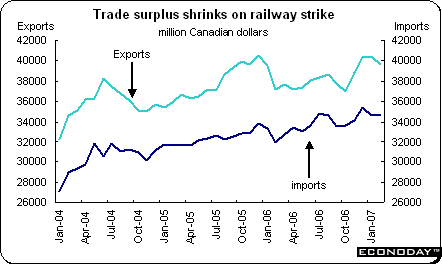
Bottom line
As expected, both the Bank of Japan and European Central Bank left their policy interest rates at 0.5 percent and 3.75 percent respectively. In their press conferences following their meetings, BoJ governor Fukui said that he cannot predict when the next policy change would occur while ECB president Trichet said he would not say anything that would change market expectations. Analysts have been widely expecting the next interest rate increase in June. Economic data were mixed for the week.
This week’s economic indicators focus on inflation data in the U.S., UK and eurozone. Retail sales data are also on tap. And everyone will hone in on the first reading of GDP growth for the U.S. later in the week. In the UK, the Bank of England will release the minutes of the last monetary policy committee meeting. Analysts will parse the content as they try to figure out when the Bank will next increase interest rates. And foreign exchange traders will unwind pre-Group of Seven positions regardless of whether comments are made about the yen or not.
Looking Ahead: April 16 through April 20, 2007
| The following indicators will be released this week… |
| Europe |
|
|
| April 16 |
EMU |
Harmonized Index of Consumer Prices (March) |
| |
UK |
Producer Input and Output Prices (March) |
| April 17 |
EMU |
Merchandise Trade Balance (February) |
| |
Germany |
ZEW Business Survey (April) |
| |
Italy |
Merchandise Trade Balance (February) |
| |
UK |
Consumer Price Index (March) |
| April 18 |
UK |
Average Earnings (February) |
| |
|
Unemployment (February, March) |
| April 19 |
Germany |
Producer Price Index (March) |
| April 20 |
France |
Manufactured Products Consumption (March) |
| |
UK |
Retail Sales (March) |
| |
|
|
| Asia |
|
|
| April 19 |
Japan |
Tertiary Index (February) |
| April 20 |
Japan |
All Industry Index (February) |
| |
|
|
| Americas |
|
|
| April 17 |
Canada |
Manufacturing Shipments (February) |
| April 19 |
Canada |
Consumer Price Index (March) |
| April 20 |
Canada |
Retail Sales (February) |
Anne D Picker is the author of International Economic Indicators and Central Banks.
Now available at Econoday.com.


|

